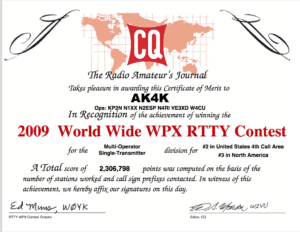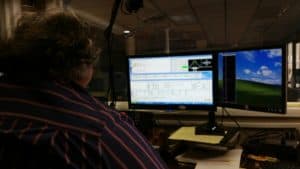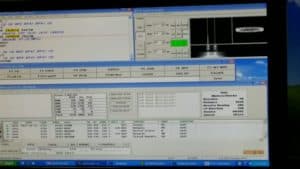Prior to this weekend, the highest score the SPARC Contesters managed in the CQ WPX RTTY contest was a commendable 4th place (U.S) in the Multi operator, Single transmitter category with a 2.3 million-point showing in 2009. That effort used the callsign AK4K with operators KP2N, N1XX, N2ESP, N4RI, VE3XD and W4CU. After this weekend, that club record is no more.

This weekend’s effort in the CQ WPX RTTY contest exceeded that score by a good margin. Operators for this weekend’s contest were Ron KP2N, Tom W4CU, Scotty N4RI, Dave KR4U, Don VE3XD, Richard, N4BUA, Bob N2ESP, Johnnie W4TSP, Paul KA4IOX, Rex KB8ESY and Tom NY4I. The team kept the station on the air for the full 48 hours of the contest. A feat even more impressive when you consider this was also the weekend of the Orlando hamfest and several of the operators also attended the hamfest on Saturday. By this time you might be wondering, what the heck is the CQ WPX RTTY Contest?
As with most contests, the objective is to contact as many other stations as possible. The mode this weekend was RTTY, which is digital mode that you may hear above the PSK portion of the HF bands. It is distinctive by its characteristic “diddle” sound. As with any digital mode, the main interface is a computer that generates the keying signals for the radio (FSK) and decoding software that processes the received audio into text readable by the operator and the computer logging software. There are many types of contests and each has its own specific objectives. Usually one is interested in points—the number of stations you contact—along with multipliers, which are the unique twist for each contest. For example, in DX contests different countries count as a multiplier. So if I have 10 contacts—each for one point—and work 5 different countries, the score is 50. The scoring for each contact varies—as in this contest contacts with our own continent (North America) are worth one point, but contacts with other countries are worth 3 points. But the basic idea of multiplying QSO points by the number of unique “multipliers” gives the score. That means we always want to add as many multipliers as possible. Now in many contests, there are far more US stations than DX stations. But in the WPX contest, unique prefixes are the multiplier. That means that if we use a call that has a somewhat rare prefix, we are the multiplier and other stations want to work us. This weekend we used your author’s callsign, NY4I. As NY4 is only a 2×1 prefix (there was no NY4AA or NY4AAA issued), there are only 26 stations in the entire world that have the NY4 prefix. While there are some NY4 stations that are also contesters (NY4A), we did not hear any other stations in this weekend contest. What this means, is that the operators at the club station could act like the DX stations and camp out in one place and call CQ the entire weekend. This is known as “running a frequency”. This is a much more efficient way to make contacts rather than searching for other stations and working them (Search & Pounce). If you have any wondered how it would be to operate on the other side of the pileup where stations call you, a prefix contest is the place to be.


We had plenty of food available to keep the team running. The famous contest chili was there as well as hot dogs, drinks, doughnuts and the usual assortment of goodies in the station. As fas as the equipment, we used the newly elevated Log Periodic for the 20 and 15 meter bands and a simple dipole for the 80 and 40 meter band. The equipment was an Elecraft K3 and an SPE 1.3k-FA solid-state amplifier running around 1200 watts. The software used was the club standard WriteLog which particularly excels at RTTY contests.
So, how did we do? The total points submitted for this contest were over 3 million! We had 1923 contacts with 675 unique prefixes for a total score of 3,121,200. Not too bad at all!
This was a great team effort led by Ron KP2N as the organizer. Many thanks to all the operators that came out and supported the effort. We will not know r where we placed in the standings for a few months, but regardless, this was a great testament to what this club station can do especially after the hard work of the club’s tower project. The only thing missing from this weekend was you! We had new operators this weekend as well as old pros. The camaraderie of the operating team makes it a great way to spend some time “playing radio”. As I have said many times, you do not need experience. You just need a desire to learn something new, have fun with some fellow hams, and get on the radio. Our next planned contest is also a RTTY contest but this is a short one. It starts at 1:00 PM on Saturday, February 25. Right after that is a phone contest on March 4rd. This is the ARRL SSB International DX contest. This contest encourages DX stations to work US stations so while not as big a multiplier as NY4 in a prefix contest, it still gives plenty of opportunities to work DX. Watch the new Club Station Activities page for more information. We welcome all to come down and operate or just stop by the watch and learn. I promise you will have a great time no matter what you choose to do.
